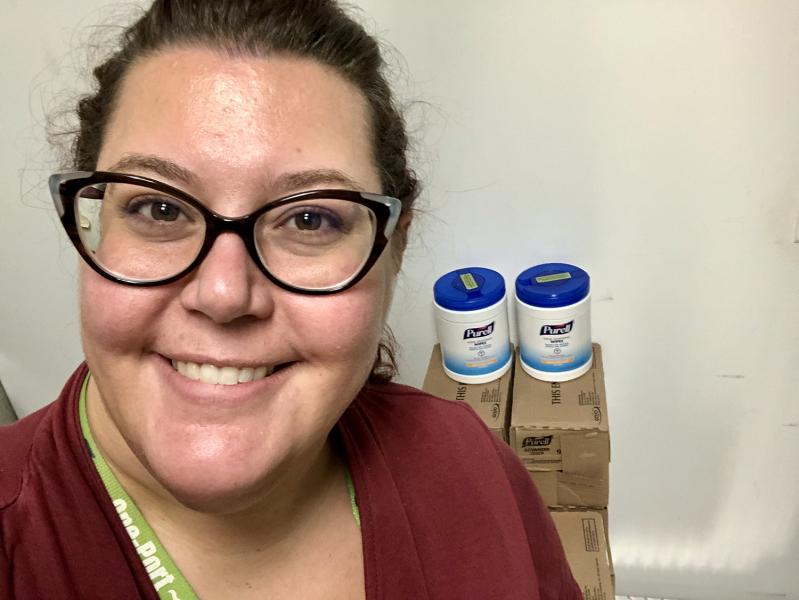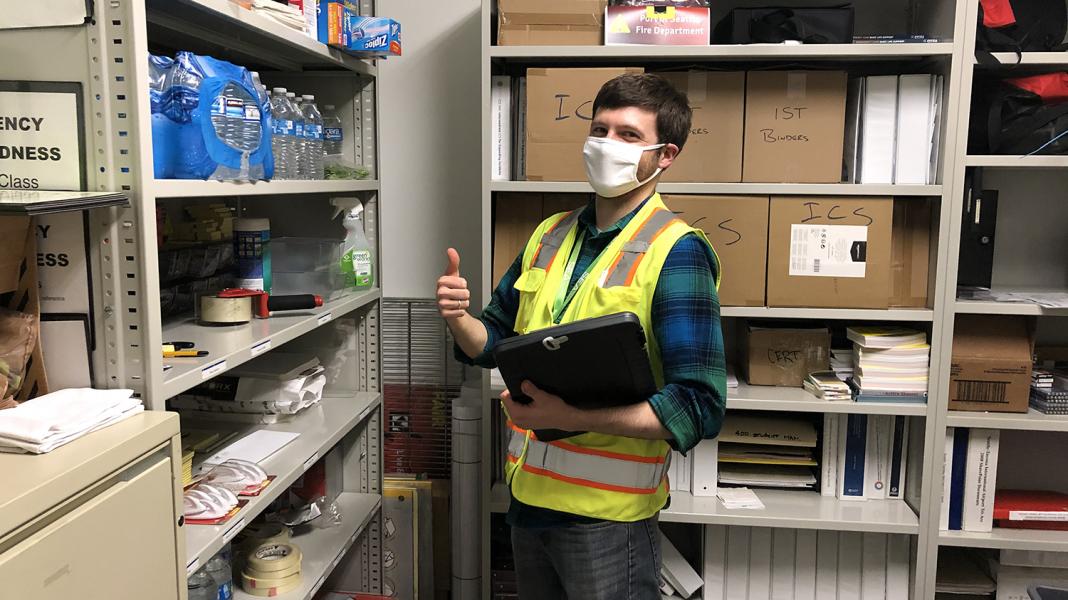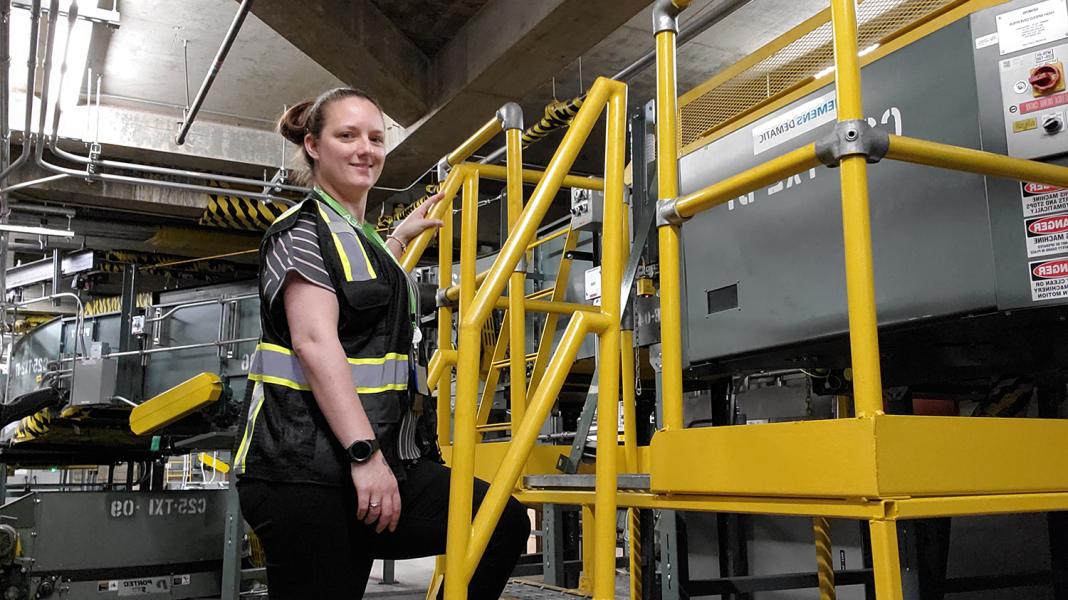
Our Frontline Fridays series featuring Port employees whose hard work and dedication keeps our facilities running safely during challenging times.
Today we check in with three employees from the Emergency Preparedness team who ensure that Port employees have the necessary supplies to stay safe and protect our customers and travelers. Recent efforts include distributing hand sanitizer and Personal Protective Equipment (PPE) to Port employees and passengers at Seattle-Tacoma International Airport..
Kati Davich, Emergency Preparedness Planning and Program Manager

1. Tell me about your role at the Port.
Our team works with Port facilities and stakeholders to prevent, protect, mitigate, respond to, and recover from threatened or actual natural disasters, man-made disasters, or acts of terrorism. We develop plans, policies, and procedures; train employees; and plan to have essential equipment and system in place before an emergency. I had been focusing on a Port-wide Continuity of Operations (COOP) Plan update project when COVID-19 hit. While the pandemic put a stop to some of my advanced COOP planning and training, it has illustrated the importance of devoting “blue skies” time to emergency planning.
2. How has your role changed since the COVID-19 pandemic began?
When COVID-19 hit, the focus of our work moved from preparedness to response. In a health-related event, the Port’s Health and Safety Department takes the lead, and the Emergency Preparedness team works with them to provide support for a successful response and recovery. My particular role during the pandemic has been in the areas of organization and communication. The Port quickly adopted Microsoft Teams to support remote work, and I helped set up one of the first cross-functional Teams implementation for COVID-19 response. We’re now working on workforce and operational recovery. Using the federal and state reopening guidance, I created the recovery framework that was used to create guidance for all departments on workforce and recovery planning. I created an online playbook used by Port leaders to plan for return to work operations. The situation is so unique and dynamic that there’s been lots to learn and implement in a short period of time — the first half of the year went by in a blink of the eye!
3. What do you love about your job?
Can I say “everything?” First, I love working for the Port. If you like learning how stuff works, the Port provides seemingly endless opportunities to geek-out learning about machinery, technology, systems, processes, and so forth. The diversity of Port employees — both in who they are and in the work they do — is also of great value. Part of my job includes recruiting, training, and managing an Incident Response Team to assist during emergencies. In addition to the team members learning the particular roles we’d like them to be prepared for, every team member brings their own expertise to the program – ranging from maintaining a snowplow to speaking another language. I also love that the Port truly values the development of employees and having them advance within the organization. I worked in marketing and communications for the first ten years of my career. When I started feeling like I’d gone as far as I could or wanted to in the field, I wasn’t sure where else I could use my particular skill set. The Port offered a Community Emergency Response Team (CERT) course, which I took out of personal curiosity (as a Minnesotan wondering what to do after an earthquake). During the CERT training, I started to realize my event planning skills would work well for preparedness planning and logistics. Wanting to learn more, I had an internal internship with the Emergency Preparedness team and really caught the preparedness bug. A few years later my current position opened up and — lo and behold — here I am! I really love using my talents to help prepare people to respond to emergencies.
I also love our small-but-mighty Emergency Preparedness Department. You’re also reading about how Ashley and Gerard are helping during COVID-19, and my supervisor Randy Hansen, Sr. Emergency Preparedness Manager, and coworker Brian Kyser, Training & Exercise Coordinator, are great mentors. I can shine as a “helper” on this team.
4. What keeps you motivated during this time and what have you learned from the experience?
My brain clicks into high gear during events – whether the marketing or emergency variety – so I’d say that’s where the motivation comes from … kind of like an “OK, it’s go time!”
Gerard Checchia, Internal Intern, Emergency Preparedness

1. Tell me about your job responsibilities on a typical day.
I started with Emergency Preparedness in January. In the beginning I was compiling supplies for Emergency Preparedness bug-out bags (a portable kit containing items required to survive for 72 hours in the elements when evacuating from a disaster) that included a headlamp, ponchos, space blankets, and other tools to help people survive. I put these kits together, distributed them to all facilities, kept supply closets stocked, and installed stair chairs at emergency exits around the airport.
2. How did your job change after COVID-19?
In March, I helped define what kinds of Personal Protective Equipment (PPE) like hand sanitizers, face coverings, and gloves were on hand and what needed to be purchased. I helped determine the supplies needed for every department and how long they would last. Our procurement specialists placed orders for hand sanitizers and disinfectant spray but supplies were backordered for months and months. After searching, we sourced sanitizer from two local distilleries, then had to repackage from gallon jugs to smaller containers. Now that face coverings are being worn in all public spaces at the airport, I’ve been working with members of our excellent Incident Support Team to package, sort, and distribute face coverings to be handed out to passengers. We’ve staged 3,300 with more on the way.
3. What is helping you feel safe or supported right now?
When I started seeing nightly emails from Executive Director Steve Metruck, I thought “Someone is writing these emails and sending them out at midnight; that shows how much our leadership cares and is working toward solutions.” The Port has also been holding workshops and Virtual Town Halls related to mental health and keeping us informed on how to stay healthy and safe right now. Having access to all this information makes me feel safe, that I’m not being forgotten and that my safety and health comes first. I feel like I’m taking a risk being onsite, but it’s the smallest possible risk because I know what I can do to mitigate my risk. I don’t touch things I don’t have to and I wash my hands. With reduced passenger numbers it’s also not that hard to physical distance right now. Trains are running with one or two cars, and we have hand sanitizer everywhere.
4. What is keeping you motivated right now?
For me it’s been my family. I’m thankful that they have been healthy, but I know it’s affecting everyone around me. When I’m at work, I look out my window and still see planes being loaded and fueled, and see that we’re adapting to new ways of doing things. Knowing the work I am doing is helping keep people healthy is motivating. What we are doing will continue to ensure that everyone is able to come to work.
Ashley Brooks, Emergency Preparedness Coordinator, Emergency Preparedness

1. Tell me about your role at the Port.
I keep track of sanitizer levels and orders, train on FEMA courses, and install emergency supplies in places used by the skilled trades workers. These supplies include items such as Trauma Kits, Backboards, and Automated External Defibrillators (AED’s). Working on this project has been the most time-consuming because I’m learning to read maps and grids, navigating the nooks and crannies of the airport, and collaborating with the skilled trades employees on placement. I have just finished a project to order, stock, and centralize inventory for emergency supply cabinets.
2. How have your job responsibilities changed since COVID-19?
As COVID-19 came along, we started ordering sanitizer and disinfecting wipes, and identifying items that had been backordered. We delivered supplies to Port departments, created a centralized request list to streamline the ordering process, and created handouts to define standards for Washington hands and cleaning surfaces using these products.
3. What do you love about your job?
I love that I can always discover a new place in the airport. As I adjust to my new role, I love meeting new people and appreciate how nice everyone has been during this tough time. I love that the work we do matters, and that we’re helping employees be prepared and feel safe, whether it’s for COVID-19 or some other type of incident.
4. What is making you feel safe or supported right now?
I feel safe going into work right now because I know that the Port’s first priority is protecting the safety and health of our employees and community. I am confident in the protocols we are following at the airport to keep people safe and I see passengers and employees physical distancing. I’m proud of what we are doing to keep Port employees and construction contractors working. The Port has also provided a few ways for employees to connect, come together to learn something new, and show that we aren’t alone. I feel supported by my department and the Port, as they allow me to continue to bring the Port towards preparedness and safety while doing what I need to do for my family during this time.
Check out the other installments in our Frontline Fridays series:








